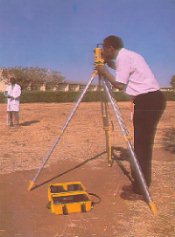


In its rapidly developing economy, Botswana's education system provides a firm foundation, at the same time ably meeting the challenge of fully equipping skilled personnel. A report of the National Commission on ?Education, a most significant event of the past financial year of 1993/4 reviews the entire educational structure of the nation from pre-primary through tertiary education.
School children enjoy a class outdoors. Inset: Pupil at an auto trade school carries out maintenance on a bulldozer.
With the aim of aligning the system more closely to the country's current socio-economic needs, the commission's comprehensive recommendations are expected to have far-reaching effects on the future education of Botswana's children. In order to address many of the shortages of skilled manpower currently being experienced, more emphasis is being placed on conventional and technical education while, in pursuit of the goals of a dynamic education philosophy, individuals are offered a lifelong opportunity to develop themselves and to make their country internationally competitive. In this ultimate aim of preparing individuals for life, adequate preparation for the world of work is one of the central goals of the curriculum
OBJECTIVES OF EDUCATION POLICY
Central to increasing the competitiveness of the country's economy, the government continues to place great emphasis on the development of human resources, the goal being to prepare Botswana for the transition from a traditional agro-based economy to the industrial economy to which the country aspires. As a means of achieving this, it aims at raising productivity through education and training, and through acquiring entrepreneurial, managerial and technological capabilities.
The overall objectives of national education include the following :
PROGRESS
Since gaining independence Botswana has made remarkable progress in ensuring that adequate educational facilities are made available to the entire population. By the time of the 1981 census, approximately 83.5 percent of children of primary school age were attending school, provision for secondary and tertiary education had escalated dramatically and great strides had been made in improving literacy levels and providing practical education. Between 1979 and 2992 enrolments in primary schools rose by 91 percent, in secondary schools by 342 percent and at the University of Botswana by 315 percent.
The major focus of curriculum development and activities continues to be a practical and relevant nine-year basic education system catering for a broad range of student's attitudes, aptitudes and abilities. With emphasis placed on practical aspects of subjects, the aim is to equip students with the basic skills and knowledge required after termination of formal education, in preparation for future careers.
A national commission of education, appointed to review Botswana's
education system, concerns itself with ways and means by which
vocational education and training can be given pronounced emphasis,
thereby assuming a higher profile within the system generally
while forming an integral part of it.

A lecturer giving instructions on how to work with a theodilite at the Gaborone Polytechnic.
EDUCATIONAL INSTITUTIONS
Primary schools in Botswana are either government, government-aided, or privately funded institutions, the government's goal being that all Botswana children should attain the minimum level. The primary school leaving examination certificate is standardised according to internationally accepted criteria, with those attaining it entitled to proceed to junior secondary level and, thereafter, to senior secondary school.
Botswana's rapid population growth has placed increasing stress on the urgency of acquiring additional educational facilities. Accelerated construction of new community junior and senior secondary schools as well as extension and renovation of existing schools is taking place.
In order to stimulate and generate productivity consciousness in Botswana, the Botswana National Productivity Centre was established in 1993. The mission of this parastatal body is to work with the state, the private sector and the trade unions in promoting productivity as a long-term strategy for the creation of employment opportunities, international competitiveness and improvements in living standards. Courses, workshops and seminars - for all levels of personnel from all sectors of the economy - are designed to address specific managerial and employee needs and ensure that delegates learn new skills allowing them to do their jobs more efficiently and effectively.
The University of Botswana has a remarkable historical background, having opened in 1964 as the University of Botswana, Bechuanaland and Swaziland, changing two years later to that of Botswana. Lesotho and Swaziland. Later, two colleges formed the University of Botswana and Swaziland, and these in 1982 became fully fledge independent universities.
ADDITIONAL PROGRAMMES
In order to improve the quality of education a number of innovative programmes have been initiated. The highly successful break-through programme, patterned after a model originating in England, allows groups of children to assist each other to become literate through exploration of a kit provided, thus doing away with rote memorisation. The national special education programme, another modern addition, helps to assess the problems of children with learning disabilities; parents are also given assistance by being shown how to help their children. The teacher competency instrumentals programme helps teachers to assess the clarity of their instruction and provides advice on discipline and other problem areas.
In-service training is provided by a network of educational centres throughout the country, with professional workshops, conferences and seminars regularly held in order to keep teachers informed of developments in educational programmes.
Tirelo Sechaba is a scheme by which graduates of senior secondary
schools learn about national problems and about life in rural
areas. It is meant to benefit the youth by exposing them to self-reliance
and by developing initiative. A certificate (or exemption) showing
completion of this service is required before students can enter
tertiary institutions.

Stress testing a roof truss at the Gaborone Polytechnic. ->
TECHNICAL AND VOCATIONAL TRAINING
Expansion of existing vocational training centres is envisaged, with new courses being introduced and student intakes in existing training programmes being increased. Specific training programmes catering for sectors critical to the country's development, such as manufacturing, industry and services, will be offered as part of the government's effort to address some of the needs of the private sector.
The Department of Technical Education of the Ministry of Education provides facilities for training in a higher technical diploma and degree education, as well as conventional education on apprentice or artisan levels. Botswana Polytechnic trains highly qualified technicians in civil, mechanical and electrical engineering, as well as offering degree course programmes in association with the University of Botswana. It also provides teacher training in design and technology for secondary schools. Both practical work and professional problem solving in a technical environment are handled.
Vocational training centres concentrate on artisan training in co-operation with the Ministry of Labour and Home Affairs, within the framework of the Botswana apprenticeship scheme. Training in commercial trades and occupations as well as computer courses are offered. Brigades on the other hand, concentrate on skills upgrading courses leading to trade tests, as well as apprenticeships and other skills courses in designated trade areas.

 go back
go back